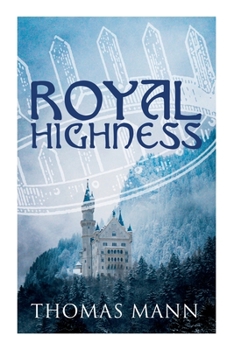Royal Highness: Philosophical Novel
Select Format
Select Condition 
Book Overview
In "Royal Highness," Thomas Mann explores the intricate dynamics of aristocracy and individual aspirations within a German principality in the early 20th century. Through the poignant journey of Prince Gabriel, Mann delves into themes of identity, duty, and the conflict between personal desires and societal expectations. The novel is characterized by its rich, evocative prose and psychological depth, marked by Mann's signature blending of the lyrical with a critical examination of social structures. Set against the backdrop of a crumbling monarchy, it reflects the anxieties of a society on the brink of modernity, thereby situating itself within the broader literary movement of modernism that sought to capture the complexities of the human condition amidst changing historical realities. Thomas Mann, regarded as one of the towering figures of 20th-century literature, was deeply influenced by his own experiences within a German aristocratic family. His acute awareness of the tensions between privilege and existential introspection informs his narrative. "Royal Highness" was written during a time of political unrest and cultural transformation in Germany, reflecting Mann's engagement with the implications of class and identity against a backdrop of impending societal change. This novel is highly recommended for readers interested in the intersections of personal and political life, as it offers a profound meditation on the nuances of human ambition and the moral complexities of privilege. Mann's thoughtful prose invites readers to reflect on the societal forces that shape individual destiny, making it a compelling read for those fascinated by the interplay of history, identity, and psychology.
Format:Paperback
Language:English
ISBN:8027343518
ISBN13:9788027343515
Release Date:July 2022
Publisher:E-Artnow
Length:172 Pages
Weight:0.52 lbs.
Dimensions:0.4" x 6.0" x 9.0"
Customer Reviews
3 ratings
My first Thomas Mann-- seems like a good place to start.
Published by Thriftbooks.com User , 18 years ago
I was interested in reading Thomas Mann-- it was a big hole in my knowledge of German literature. A friend of mine who is something in the way of a Mann scholar recommended that I begin with Royal Highness. I loved it. I have seen it compared to a fairy tale, but if so it is a fairy tale for modern times. The Prince is heir to a line of helplessness and theater and the Princess is a railroad heiress driven from US society because of mixed racial heritage. I have also heard the theme of the book described as the US providing the necessary energy and change to a decaying European nation. While that is true, it is also worth bearing in mind that it is only in Europe that the railroad baron can find a place to rid himself of his legacy of exploitation. It is also only in Europe that he finds his daughter can be accepted despite her Native American grandmother. Royal Highness is the optimistic marriage of two cultures which leads to cultural renewal as much as it does a love affair. The Curtis/McNab translation seemed very well done-- it had none of that strange stiffness than can often characterize German prose translated into English. I do not know how this will compare to other Mann books, but it was a big success as a first experience.
Mann's fairy tale
Published by Thriftbooks.com User , 20 years ago
Here is an early Mann work that might be an excellent introduction to those who are interested in his work. It is witty, the story flows naturally and it is much less sombre than many of his later works. The plot centers around a small German town that is a "throwback" to the days of royalty. It maintains a monarch, although the position is mainly just for show. A young Prince is promoted to being a "virtual" monarch when his lazy older brother feels he has better things to do with his time than be king. The Prince, then, does his best to use his "exalted" (albeit symbolic) position to better the quality of life of his people. Unfortunately, the financial ministers of the kingdom are incompetent enough to make the ENRON executives proud with their mis-dealings. For a refreshing look back at 19th (and perhaps early 20th) century Germany, this is a truly wonderful book. Mann's prose is exquisite and he always manages to poke fun at "royalty" in the most subtle ways. So, if you're looking for a fairy tale for grownups, the great Thomas Mann just MIGHT be the place to look!
Not for the Mann novice, but a great book.
Published by Thriftbooks.com User , 24 years ago
Thomas Mann is an excellent author, but if you've never read anything by him before, begin with "Magic Mountain" and "Death in Venice," followed by "Buddenbrooks" and "Felix Krull" before tackling this book. This is Mann's second novel and a bit of a letdown from "Buddenbrooks." Mann uses the literary technique he would later exploit in such marvelous fashion with "Magic Mountain" -- that is, examining a small, isolated part of society as a microcosm of the larger whole, namely Europe.Without giving away any of the surprises, this book is about a rather idealistic female's impact on a small village. Mann poses thoughtful questions about the usefulness of artistic values in a bourgeois society while revealing the inner nuances of his characters as he does so artfully, as in "Buddenbrooks" and "Felix Krull."To top it all off, this Mann novel is probably his most humorous. For those not knowledgable on Mann, he is not readily identifyable for the humour in his works, making this one rather noteworthy.






